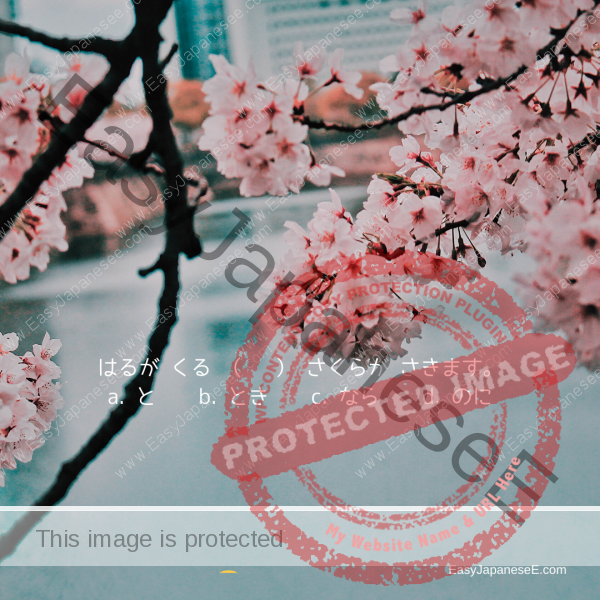
はるが くる ( ) さくらが さきます。
- と b. とき c. なら d. のに
A: はるがくる = spring comes
B: さくらが さきます = cherry trees bloom
The most appropriate way to connect these two would be “When spring comes (A), cherry trees will bloom (B)” in the way that “when A happens, B will always follow.” As I explained in my previous post “Differences among ~と, ~とき and ~たら”, the most appropriate conjunction here is a. と. More examples of this pattern are:
ごはんをたべるとふとります。
If you eat rice, you’ll gain weight.この本をよむと、いつもねむくなります。
When I read this book, I always get sleepy.チョコレートをみると、食べたくなります。
When I see chocolate, I always want to eat it.さみしくなると母(はは)に電話(でんわ)します。
When I feel lonely, I always ring Mum.外国語(がいこくご)を勉強(べんきょう)すると、自分(じぶん)の言語(げんご)がよくわかるようになります。
When you study a foreign language, you get to know your own language better.この曲(きょく)を聞(き)くと、父(ちち)を思(おも)い出(だ)す。
This tune reminds me of my father.ヨガをすると体がやわらかくなります。
When you practise yoga, your body become flexible.学校(がっこう)に行(い)くとお腹(なか)がいたくなります。
When I go to school, I get a stomachache.夕食(ゆうしょく)の後(あと)でコーヒーを飲(の)むと、眠(ねむ)ることができません。
I can’t sleep when I have coffee after dinner.
b. とき is used to pin-point a time but it is not easy to tell when exactly spring comes or has come, so b. is not the right choice here.
c. なら is to indicate an assumption or a condition, so if you use なら here, it sounds like you are not really sure if spring is coming.
d. のに is more like “even though”, so it is not appropriate here. However, sometimes, cherry trees bloom out of season, then you can say:
あきなのに さくらが さいています。Even though it is autumn, the cherry trees are in bloom.
Please visit my JLPT N4 Grammar page for other grammar items.
![[dictionary form verb] + と](https://www.easyjapanesee.com/wp-content/uploads/2020/07/200716-春が来ると.png)
